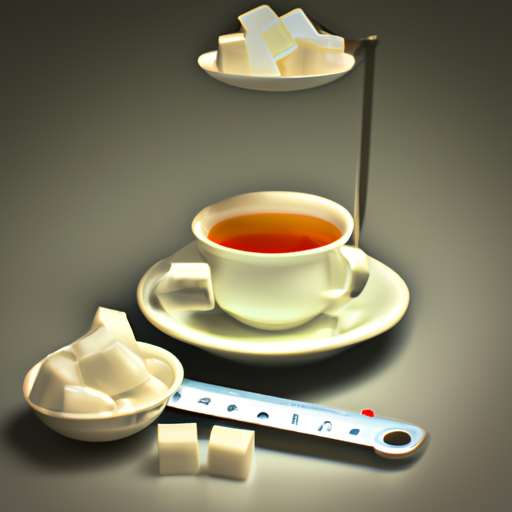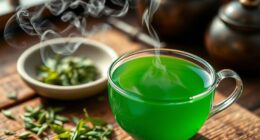I have always been a fan of enjoying a nice cup of tea. However, my recent discovery of chai tea has completely captured my attention. Originating from India, chai tea is a blend of black tea with various spices, and it has been savored for hundreds of years.
Not only does it taste delicious, but it also offers numerous health benefits. Chai tea contains a variety of spices such as cinnamon, ginger, cloves, and cardamom which provide numerous health benefits. These spices are rich in antioxidants which can help protect the body against free radicals and reduce inflammation.
Additionally, chai tea has been shown to aid digestion, regulate blood sugar levels, boost immunity, promote relaxation and stress reduction, and even aid in weight loss. In this article we’ll explore the history and origin of chai tea as well as dive into its ingredients and various health benefits.
Key Takeaways
- Chai tea is a spiced black tea from India that contains cinnamon, ginger, cloves, and cardamom, all of which provide health benefits such as anti-inflammatory properties, regulation of blood sugar, and antioxidant effects.
- Traditional brewing of chai involves boiling black tea leaves with spices, and adding milk and sugar. Milk enhances the health benefits, and alternatives like almond, coconut, soy, or oat milk can also be used.
- Chai tea offers a range of health benefits such as preventing chronic diseases like heart disease, diabetes, cancer, Alzheimer’s, improving brain function, boosting immunity, aiding digestion, regulating blood sugar, and aiding weight loss.
- Other spices like curry powder, garam masala, cumin, and turmeric, as well as adaptogenic herbs like ashwagandha, also offer health benefits. Tea culture is significant in many countries and offers a calming effect on the nervous system, while other teas like green tea, black tea, and herbal teas also have their own unique health benefits.
History and Origin of Chai Tea
The history and origin of chai tea can be traced back to the Indian subcontinent. Chai tea’s cultural significance in India is immense, as it’s been a staple beverage for centuries.
The word ‘chai’ itself means ‘tea’ in Hindi, and the drink is deeply ingrained in Indian culture. Traditional brewing methods involve boiling black tea leaves with spices such as cinnamon, cardamom, ginger, and cloves.
Milk and sugar are then added to create a creamy and sweet flavor profile. These ingredients not only add flavor but also have health benefits, making chai tea a popular choice among health-conscious individuals.
Chai tea has since spread beyond India’s borders and become a beloved beverage worldwide. In the next section, we’ll explore the various ingredients used to make this delicious drink.
The Ingredients of Chai Tea
I’m excited to dive into the ingredients of chai tea!
When it comes to tea, I appreciate its versatility in flavor and benefits for our health.
In particular, the spices used in chai tea provide a unique and delicious taste while also offering various health benefits.
Additionally, the use of milk creates a creamy texture that complements the flavors perfectly.
The Role of Tea
By sipping on a warm cup of chai, you can reap the advantages that tea has to offer. Tea is more than just a beverage; it’s a cultural symbol and plays an important role in social interactions.
In many parts of the world, tea is seen as a way to connect with friends and family. It’s not uncommon for people to gather over cups of tea and engage in deep conversations.
Tea also has health benefits that make it an excellent choice for your daily routine. For instance, tea is packed with antioxidants that help protect your body from harmful free radicals. Additionally, tea contains caffeine which can boost energy levels and improve mental performance.
By incorporating tea into your lifestyle, you can enjoy these health benefits while also connecting with others over this beloved drink.
As we explore the benefits of spices in chai tea, it’s important to note that these ingredients work together harmoniously with the base of black or green tea leaves.
The Benefits of Spices
Sipping on a warm cup of chai with its aromatic blend of spices can transport you to a world of exotic flavors and tantalizing aromas. These spices not only add flavor to the tea but also offer several health benefits when consumed regularly.
The spices used in chai, such as cinnamon, ginger, cardamom, and cloves, have been traditionally used in cooking for their medicinal properties. Cinnamon is known for its anti-inflammatory properties and helps regulate blood sugar levels. Ginger aids in digestion and has anti-nausea effects. Cardamom has antioxidant properties that help fight inflammation and lower blood pressure. Cloves are rich in antioxidants and are believed to have pain-relieving abilities due to their eugenol content.
These Ayurvedic herbs incorporated in chai make it more than just a delicious beverage but one that supports overall well-being.
As we move onto the subsequent section about the use of milk, it’s important to note that adding milk does not decrease the health benefits offered by these spices but rather enhances them by providing additional nutrients such as calcium and protein.
The Use of Milk
Adding milk to your chai may seem counterintuitive for those who are lactose intolerant, but there are alternative milk options that can still enhance the flavor and offer additional nutrients. Milk alternatives such as almond, coconut, soy, and oat milk can be used instead of dairy milk. These alternatives not only provide a creamy texture to your chai tea but also bring their own unique flavors to the mix.
When preparing your chai tea with milk, it’s important to find the optimal milk to tea ratio that suits your taste buds. A good rule of thumb is to use equal parts of milk and water in your recipe. This will ensure that the flavor of both the tea and the milk complement each other without overpowering one or the other.
By finding the right balance between these two ingredients, you can enjoy all the benefits that come with drinking chai tea while also satisfying your craving for a rich and comforting beverage.
With its delicious taste and numerous health benefits, it’s no wonder why chai tea has become so popular around the world. In addition to its warm and inviting aroma, this spiced beverage is known for its antioxidant properties which we’ll explore in our next section.
Antioxidant Properties of Chai Tea
You can boost your body’s defenses with the antioxidant-rich chai tea. Chai tea is known for its antioxidant properties, which help in preventing cell damage caused by free radicals. The types of antioxidants found in chai tea include catechins, flavonoids, and polyphenols. These antioxidants fight against inflammation and reduce oxidative stress on the body.
Chai tea’s antioxidant properties have a variety of benefits for the body. For instance, it helps to prevent chronic diseases such as heart disease, diabetes, and cancer. The anti-inflammatory properties help in reducing inflammation throughout the body, which can cause various ailments if left unchecked. Additionally, drinking chai tea has been associated with improved brain function and a reduced risk of developing neurodegenerative diseases like Alzheimer’s.
Incorporating chai tea into your daily routine can be an easy way to improve your overall health. With its high levels of antioxidants and anti-inflammatory properties, it’s no wonder people are turning to this delicious beverage for its many health benefits.
In the next section, we’ll discuss how drinking chai tea can also aid in digestion without causing any adverse effects on the body.
Digestive Benefits of Chai Tea
I love drinking chai tea, not just for its delicious taste, but also for its many health benefits.
One area where it really shines is in aiding digestion. The spices used in chai tea have been shown to play a role in promoting healthy digestion. Ginger and cinnamon are especially beneficial in this regard.
The Role of Spices in Digestion
When enjoying a cup of chai tea, the spices blended in can help stimulate your digestive system and get things moving smoothly, almost like a well-oiled machine. This is because the spices used in chai tea, such as ginger, cardamom, cinnamon, and cloves have traditionally been used for their digestive benefits from an Ayurvedic perspective.
By incorporating these spices into your diet through drinking chai tea, you can support gut health by easing bloating, reducing gas, and even aiding in the absorption of nutrients.
Ginger is one of the key players in the blend of spices found in chai tea when it comes to digestion. Ginger has anti-inflammatory properties that may help reduce inflammation within the gut, which can lead to stomach discomforts. Additionally, ginger has been shown to speed up gastric emptying, which means that food moves faster through your digestive system and may ease symptoms such as nausea or vomiting.
Incorporating ginger into your diet via drinking chai tea may be especially beneficial for those who experience occasional digestive discomforts after eating.
The Benefits of Ginger
Imagine feeling relief from stomach discomforts and faster digestion just by incorporating a spice like ginger into your meals. Ginger has been used for centuries in traditional medicine to treat various ailments, including digestive issues. Studies have shown that ginger can help reduce nausea, bloating, and abdominal pain.
If you’re not a fan of adding ginger to your meals, you can still reap its health benefits by drinking ginger tea. Here are three quick and easy ginger tea recipes:
- Slice fresh ginger and add it to boiling water with honey and lemon juice for a soothing drink.
- Brew black tea with sliced ginger and cinnamon sticks for an added kick.
- Steep grated ginger in hot water with turmeric powder for an anti-inflammatory boost.
Speaking of cinnamon, this spice also has numerous health benefits that make it a great addition to chai tea.
The Benefits of Cinnamon
Who knew that the cinnamon in your favorite dessert could actually have some positive effects on your health? Cinnamon is a spice that’s been used for centuries in traditional medicine and cooking. It contains compounds such as cinnamaldehyde, which give it its distinct flavor and also provide numerous health benefits.
One of the most well-known benefits of cinnamon is its ability to regulate blood sugar levels. Studies have shown that cinnamon can help improve insulin sensitivity, which may be helpful for people with type 2 diabetes.
Cinnamon has also been linked to improved heart health, due to its anti-inflammatory properties. Additionally, cinnamon oil has been found to possess antibacterial and antifungal properties, making it useful for treating certain infections.
Incorporating cinnamon into your diet can be as simple as adding it to your morning oatmeal or trying out new recipes that feature this flavorful spice. Cinnamon’s many health benefits make it a great addition to any diet. Its anti-inflammatory properties are particularly noteworthy when considering the many other ingredients commonly found in chai tea that also possess these properties.
Anti-inflammatory Properties of Chai Tea
I’m excited to talk about the anti-inflammatory properties of chai tea.
Inflammation is a natural response in the body, but it can become chronic and lead to various health problems.
Luckily, some ingredients in chai tea, such as cardamom and cloves, have been found to possess anti-inflammatory properties that may help mitigate these issues and improve overall health.
The Role of Inflammation in the Body
Reducing inflammation is crucial for maintaining good health, and drinking chai tea can help achieve this goal. Chronic inflammation is linked to a wide range of diseases such as heart disease, diabetes, cancer, and Alzheimer’s. It occurs when the immune system creates a response to an injury or infection that doesn’t go away over time. Chronic inflammation can lead to tissue damage and contribute to the development of various health problems.
Fortunately, there are natural remedies for inflammation such as consuming foods rich in antioxidants like spices found in chai tea. Chai tea contains several anti-inflammatory ingredients including cinnamon, ginger, and black pepper. These spices have been shown to reduce inflammation in the body. The combination of these spices with black tea also makes chai tea a potent antioxidant source that helps prevent cellular damage caused by free radicals. This makes drinking chai tea not only delicious but also beneficial for your overall health.
Drinking chai tea regularly has numerous benefits beyond its anti-inflammatory properties. One key ingredient in chai tea is cardamom. Cardamom has been shown to improve digestion and boost metabolism among other benefits.
The Benefits of Cardamom
Cardamom, found in chai tea, can improve digestion and boost metabolism, making it a valuable addition to any diet. This spice has been used for centuries in both culinary and medicinal practices. Cardamom benefits include aiding in digestion by increasing the production of digestive enzymes and reducing inflammation in the gut. It also has respiratory health benefits due to its anti-inflammatory properties that can help alleviate symptoms of asthma and bronchitis.
In addition to its health benefits, cardamom is a versatile spice that can be used in a variety of dishes such as curries, desserts, and even coffee. Its unique flavor profile adds depth and complexity to any recipe. Medicinally, cardamom has been used to treat everything from bad breath to urinary tract infections. Overall, incorporating cardamom into your diet can have numerous positive effects on your health and well-being.
Moving onto the next subtopic about ‘the benefits of cloves’, this spice also offers many potential health benefits worth exploring.
The Benefits of Cloves
You may not be aware, but adding cloves to your meals can provide a range of health benefits due to its anti-inflammatory and antioxidant properties. Cloves are widely used in traditional medicine for their analgesic, anti-bacterial, and anti-fungal properties. The active component in clove is eugenol, which has been shown to improve digestion, boost immunity, and prevent chronic diseases.
One way to incorporate cloves into your diet is by using clove-infused recipes. This could include adding whole or ground cloves to soups, stews, or roasted vegetables. Another option is using clove essential oil as a natural remedy for toothaches, headaches, or muscle pain.
In addition to digestive benefits, research suggests that cloves can help regulate blood sugar levels in people with diabetes by enhancing insulin sensitivity. Overall, incorporating cloves into your daily routine could have a positive impact on your health and wellbeing.
With the potential benefits of clove consumption in mind, let’s now transition into the subsequent section about ‘blood sugar regulation’.
Blood Sugar Regulation
When drinking chai tea, your body can better regulate blood sugar levels, helping to maintain energy and prevent crashes throughout the day. This is because chai tea contains a blend of spices that have been shown to improve blood sugar management. For example, cinnamon has been found to lower fasting blood glucose levels in people with type 2 diabetes. Additionally, ginger has been shown to improve insulin sensitivity and reduce inflammation in the body.
Incorporating chai tea into your daily routine may also help prevent the development of diabetes. A study published in the Journal of Nutrition found that consuming black tea (which is a main ingredient in chai) was associated with a reduced risk of developing type 2 diabetes. The study suggests that this may be due to the polyphenols found in black tea, which have antioxidant properties and may help protect against cellular damage.
Overall, incorporating chai tea into your diet can have numerous benefits for blood sugar regulation and diabetes prevention. In addition to its potential health benefits, it also provides a delicious and comforting beverage option throughout the day. Moving forward, let’s explore how drinking chai tea can boost immunity and support overall wellness.
Boosting Immunity
As someone who wants to maintain a healthy lifestyle, boosting my immunity is crucial. The immune system plays a vital role in protecting the body from harmful pathogens and diseases.
Luckily, there are natural ways to enhance our immunity, such as incorporating spices and tea into our diets. Both spices and tea contain properties that can strengthen the immune system and improve overall health.
The Role of Immunity in the Body
The immune system plays a crucial role in protecting the body from harmful pathogens and diseases, making it important to maintain its strength. The immune system function is to identify and destroy any foreign substances that enter the body, such as bacteria, viruses, fungi, or parasites.
It’s composed of various cells and organs that work together to keep us healthy and prevent infections. To support our immune system, there are several things we can do. One way is by leading a healthy lifestyle that includes regular exercise, sufficient sleep, stress management, and a balanced diet rich in vitamins and minerals.
Another way is by consuming foods or beverages with immune-boosting properties such as chai tea which contains numerous herbs and spices known for their health benefits. These include cinnamon which has anti-inflammatory effects; ginger which aids digestion and reduces nausea; cardamom which improves circulation; clove which has antimicrobial properties; black pepper which enhances nutrient absorption; and fennel seeds which relieve bloating.
By drinking chai tea regularly as part of a healthy diet and lifestyle, we can give our bodies the immune system support they need to stay strong against infections. Transitioning into the subsequent section about ‘the benefits of spices’, it’s worth noting that these herbs not only boost immunity but also provide other health benefits such as reducing inflammation, improving digestion, regulating blood sugar levels, promoting cardiovascular health among others.
The Benefits of Spices
Spices aren’t just flavorful additions to meals; they also offer various health benefits that can improve overall well-being. Curry powder and garam masala, for instance, have been used in traditional medicine for centuries due to their anti-inflammatory and antioxidant properties. Additionally, spices such as cinnamon, cumin, and turmeric have been proven to regulate blood sugar levels and aid in digestion.
Apart from their culinary uses, herbs and spices have been utilized as herbal remedies for various ailments. Ginger, for example, has long been used for its anti-nausea properties, while garlic has been shown to lower cholesterol levels. Incorporating these beneficial spices into your daily diet can provide numerous health benefits that go beyond just adding flavor to your meals.
It’s worth noting that chai tea, as we move on to discussing the benefits of tea, is often made with a blend of beneficial spices such as cinnamon, cardamom, ginger, and cloves. These added ingredients make chai tea not only a delicious beverage but also one that provides potential health benefits.
The Benefits of Tea
Sipping on a warm cup of tea can improve your overall health and well-being by providing antioxidants and other beneficial nutrients. Tea culture has been around for centuries, with cultural significance in many countries such as China, Japan, India, and England.
Here are three reasons why drinking tea is good for you:
-
Boosts Immune System: Tea contains polyphenols which have antioxidant properties that help to protect cells from damage caused by free radicals. This helps to boost the immune system and reduce the risk of chronic diseases.
-
Reduces Inflammation: The anti-inflammatory properties found in tea can help to reduce inflammation throughout the body. This can lead to a reduction in symptoms associated with conditions such as arthritis.
-
Promotes Relaxation: Many types of tea contain L-theanine, an amino acid that promotes relaxation without causing drowsiness. This makes it a great option for those looking to reduce stress levels.
As we move into the subsequent section about relaxation and stress reduction, it’s important to note that drinking tea is just one way to promote these benefits in our daily lives.
Relaxation and Stress Reduction
When it comes to relaxation and stress reduction, there are three key points that I find particularly important.
First, the role of stress in the body can wreak havoc on our bodies, causing a myriad of health issues from high blood pressure to insomnia.
Second, incorporating adaptogenic herbs like ashwagandha into our diets can help regulate our stress levels and promote overall wellness.
Third, sipping on calming teas like chamomile or lavender can also provide benefits for relaxation and stress reduction.
By focusing on these three key points, we can take important steps towards managing our stress levels and promoting overall health and wellness.
The Role of Stress in the Body
You might be thinking that stress is just a natural part of life and can’t be helped, but did you know that chai tea has been shown to reduce the negative effects of stress on your body? Effects of chronic stress are well-documented – it contributes to many health problems such as high blood pressure, heart disease, obesity, anxiety, and depression.
With so much at stake, it’s important to find ways to manage stress in our lives. Here are four reasons why drinking chai tea can help decrease the negative effects of stress:
- Chai tea contains adaptogenic herbs which help regulate the body’s response to stress.
- Drinking warm liquids like chai tea has a calming effect on the nervous system.
- The aroma of spices in chai tea can have a relaxing effect on both mind and body.
- The ritual of brewing and drinking chai tea can provide a sense of comfort and relaxation.
As we explore further into the benefits of adaptogenic herbs, we’ll see how they work in conjunction with other ingredients in chai tea to promote overall wellness for both mind and body.
The Benefits of Adaptogenic Herbs
By incorporating adaptogenic herbs into your daily routine, your body can better handle stress and maintain balance. Adaptogenic herbs are natural remedies that’ve been used for centuries in traditional medicine to help the body cope with various physical and mental stressors. These herbs work by regulating the production of stress hormones such as cortisol, which can wreak havoc on our health if produced excessively or insufficiently.
Some of the most commonly used adaptogenic herbs include ashwagandha, rhodiola, holy basil, and ginseng. Research has shown that these herbs help improve mood, boost energy levels, increase cognitive function, and enhance overall immunity. By incorporating these herbs into your daily diet or supplement regimen, you can support your body’s natural ability to manage stress and promote optimal health.
Moving on to the benefits of tea – did you know that drinking chai tea is one way to incorporate adaptogenic herbs into your daily routine? Chai tea typically contains a blend of spices like cinnamon, ginger, cardamom along with black tea leaves – all known for their potential therapeutic effects on health.
Stay tuned to learn more about how drinking chai tea can benefit you!
The Benefits of Tea
If you’re feeling stressed and in need of a pick-me-up, indulging in a warm cup of your favorite tea can be just the thing to help soothe your worries. Tea is not only comforting, but it also offers numerous health benefits that can improve our overall well-being.
From black and green tea to white and herbal blends, there are many different varieties of tea to choose from, each with their unique flavor profile and health properties. For instance, studies have shown that drinking green tea may reduce the risk of heart disease by decreasing LDL cholesterol levels and improving blood flow. Meanwhile, black tea has been linked to lower stress hormones levels and improved focus thanks to its caffeine content. Herbal teas like ginger or peppermint may aid digestion and alleviate nausea.
Whether you prefer your tea hot or cold, sweetened or unsweetened, incorporating this beverage into your daily routine can provide not only hydration but also potential health benefits. Speaking of which…
Weight loss and metabolism are two topics often associated with tea consumption. So if you’re looking for ways to shed some extra pounds or boost your metabolism naturally, keep reading!
Weight Loss and Metabolism
I’ve been doing some research into weight loss and metabolism, and there are a few key points that I find really interesting.
Firstly, understanding the role of metabolism in the body is crucial for anyone looking to shed some pounds.
Secondly, spices like cinnamon and ginger have been shown to boost metabolism and aid in weight loss.
And finally, tea – particularly green tea – has numerous benefits for weight loss as well as overall health.
Let’s dive into these topics a bit more!
The Role of Metabolism in the Body
Metabolism is like a furnace that burns calories and provides energy for the body. There are two types of metabolism: catabolism, which breaks down molecules to release energy; and anabolism, which uses energy to build molecules. The rate of metabolism can be affected by several factors such as age, gender, genetics, muscle mass, and physical activity level.
Factors affecting metabolism:
- Age – Metabolic rate decreases with age due to loss of muscle mass.
- Gender – Men generally have a higher metabolic rate than women because they tend to have more muscle mass.
- Physical activity level – Exercise can increase metabolic rate by building lean muscle mass.
Understanding the role of metabolism in the body is crucial in maintaining a healthy weight and overall well-being.
In the subsequent section about the benefits of spices, we’ll explore how certain spices like cinnamon and ginger can help boost metabolism and support weight loss goals.
The Benefits of Spices
Now that we have a better understanding of metabolism and its role in the body, let’s explore the benefits of spices. Spices are not only used for their culinary purposes but also have medicinal uses. They contain compounds that can improve digestion, boost immunity, and reduce inflammation.
Cumin, for example, has been shown to aid digestion by increasing the activity of digestive enzymes. Turmeric contains curcumin, which has powerful anti-inflammatory properties. However, it’s important to note that consuming too much spice can cause gastrointestinal issues and may interact with certain medications. Therefore, it’s essential to consume them in moderation and consult with a healthcare professional if you have any concerns.
Moving on to our main topic, chai tea is one beverage that incorporates various spices such as cinnamon, ginger, cardamom, and cloves. These spices not only add flavor but also offer health benefits such as improving brain function and reducing inflammation.
Let’s delve deeper into the advantages of drinking chai tea.
The Benefits of Tea
Incorporating various spices in a warm beverage can offer numerous advantages for one’s health, including improving brain function and reducing inflammation.
When it comes to tea culture, there are different types of tea that offer unique benefits. One popular choice is chai tea, which is made by brewing black tea with a mixture of aromatic spices such as cinnamon, cardamom, ginger, and cloves.
Apart from the delicious taste and aroma, chai tea has been linked to several health benefits. It contains antioxidants that help protect against cell damage caused by free radicals. Additionally, the combination of spices used in chai tea has anti-inflammatory properties that may help alleviate joint pain and stiffness.
Drinking chai tea regularly may also improve digestion and boost immunity due to the presence of ginger and other herbs known for their medicinal properties.
Frequently Asked Questions
Is chai tea safe for pregnant women to consume?
As a pregnant woman, I know how important it is to be cautious about what you consume. When it comes to chai tea, there are both benefits and risks to consider.
One interesting statistic is that chai tea contains caffeine, which can have negative effects on pregnancy outcomes. However, if consumed in moderation (less than 200mg per day), the benefits of chai tea may outweigh the risks.
Some alternatives and substitutes for those who want to avoid caffeine include herbal teas like peppermint or ginger.
It’s important to consult with your healthcare provider before consuming any type of tea during pregnancy to ensure the safety of both you and your baby.
Can chai tea be consumed by people with caffeine sensitivity?
As someone with caffeine sensitivity, I’ve found that chai tea can be a bit too stimulating for me. However, there are alternative caffeine-free options available such as herbal chai blends or decaf versions of traditional chai tea.
It’s important to note that everyone’s reaction to caffeine varies and some may tolerate small amounts of it in their diet without issue. However, if you do experience adverse effects from consuming even small amounts of caffeine, it’s best to err on the side of caution and explore other beverage options.
In general, it’s always a good idea to talk with your healthcare provider about any potential reactions or concerns before making changes to your diet.
How does chai tea compare to other types of teas in terms of health benefits?
When it comes to comparing chai tea with other types of tea, there are a few things to consider. One of the most notable benefits of drinking chai tea is its high antioxidant content, which can help reduce inflammation and prevent cellular damage.
In comparison to green tea, which is often touted for its health benefits, chai tea has been found to contain even more antioxidants per serving. Additionally, some studies have suggested that the spices used in traditional chai blends may have their own unique health benefits, such as improving digestion and boosting immunity.
Of course, it’s important to note that not all chai teas are created equal; those made with whole ingredients and minimal added sugars will likely offer the most health advantages.
Are there any potential side effects of drinking chai tea regularly?
When it comes to drinking chai tea regularly, there are a few potential risks and long term effects that should be considered.
While many people believe that chai tea can aid in weight loss due to its metabolism-boosting ingredients such as ginger and cinnamon, excessive consumption of the tea may actually lead to weight gain due to added sugar or milk.
Additionally, some individuals may experience adverse effects from the caffeine content in chai tea, such as increased heart rate or anxiety. However, overall, moderate consumption of chai tea is generally safe and may provide several health benefits such as improved digestion and reduced inflammation.
It’s important to note that individual reactions to any type of food or beverage can vary greatly, so it’s always best to consult with a healthcare professional before making any significant changes to your diet.
What is the recommended daily intake of chai tea for optimal health benefits?
I believe that the recommended daily intake of chai tea for optimal health benefits varies depending on the individual’s health status and overall lifestyle. Chai tea benefits include reducing inflammation, improving digestion, and providing antioxidants.
However, it’s important to note that excessive consumption can lead to negative side effects such as increased heart rate and insomnia. The preparation methods and flavor variations also play a role in determining the ideal daily intake.
Some may prefer a stronger brew with more spices, while others may opt for a milder version with less caffeine. Ultimately, it’s best to consult with a healthcare professional to determine an appropriate amount of chai tea consumption based on personal factors such as age, weight, and medical history.
Conclusion
All in all, I’m a huge fan of chai tea. Not only does it taste amazing, but it has so many health benefits that make it a great addition to any diet.
From its antioxidant and anti-inflammatory properties to its ability to regulate blood sugar and boost immunity, this drink truly has it all. When I sip on a warm cup of chai tea, I can almost feel my body relaxing and unwinding from the stresses of the day.
It’s like taking a deep breath and letting go of everything weighing me down. If you haven’t tried chai tea yet, I highly recommend giving it a shot. Who knows – you might just fall in love with this spicy, flavorful beverage too!










